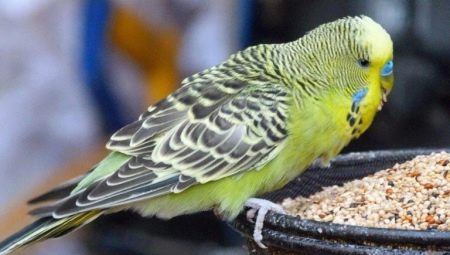Any caring owner knows that a balanced diet is the key to the health and alertness of a parrot. The main feathered diet is a grain mixture, so special attention should be paid to its composition. If you constantly offer your pet insufficient quality cereals, then this will inevitably lead to a lack of vitamins, tarnishing of plumage, the development of diseases and even death of the bird.
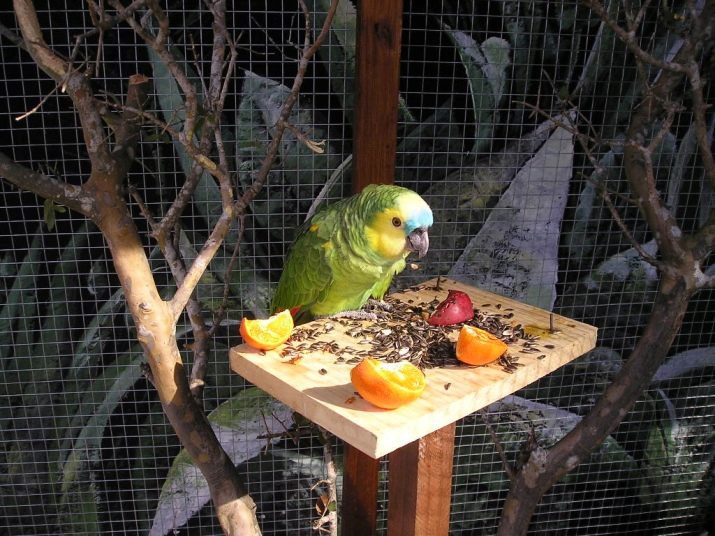
Features
Each owner should know well how to feed his parrot, and what foods should be avoided. Cereals should make up about 2/3 of the total daily diet of birds. For the most part, the dry mix consists of peeled millet - it accounts for about 70% of the total volume, and the remaining 30% includes:
- canary seed;
- flax-seed;
- hemp seed;
- oats or oatmeal;
- crushed corn;
- sunflower seeds.
In the wild, birds adhere to proper nutrition instinctively, but pets depend solely on their owners' knowledge of a competent diet and feeding habits, as well as on the availability of products necessary to maintain normal functioning. Therefore, we will dwell on what feeds are, what to look for when choosing a product and give a small rating of the best feeds according to experts.
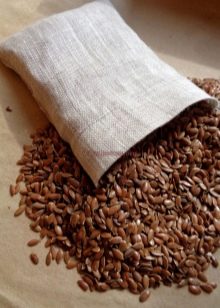
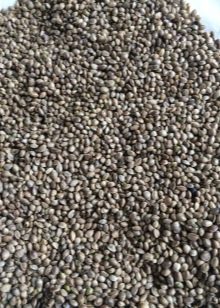
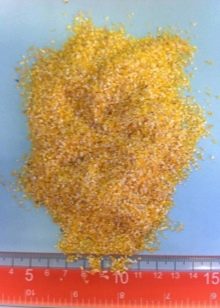
Varieties
In the segment of pet products, a wide variety of ready-made feeds for domestic parrots are widely represented. They can be either standard or specialized, consisting, for example, of a mixture of dried fruits and nuts. Usually they are used as an additive to food or treats. Produce mixtures that need to be sproutedAs well as formulations with mineral components, vitamin complexes and additives necessary during the molting and breeding of birds, there are feeds for chicks.
Medical feeds are allocated, usually they are offered to birds in courses, on average - 2 weeks 3-4 times a year.
Keep in mind that for some liver pathologies, fat-soluble vitamins are categorically contraindicated, therefore, if there is even the slightest suspicion of a pet's liver malaise, then you should definitely consult a specialist before entering stabilized feeds into the parrot menu.
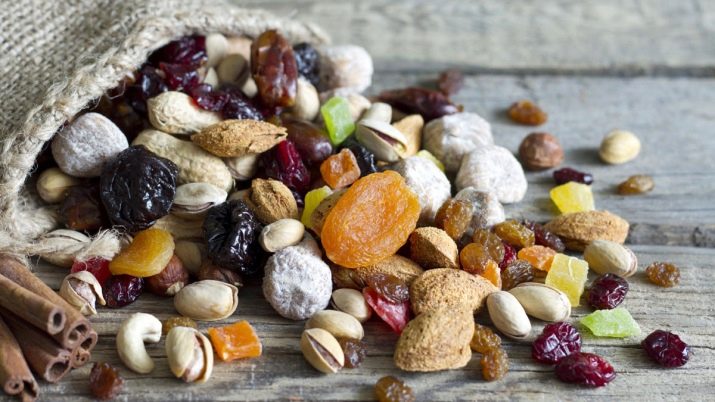
Different types of mixtures are used depending on the size of the birds.
- To small parrots carry wavy, as a rule, feed for them include oats and millet. A slight admixture of sunflower and hemp seeds is allowed - their content usually does not exceed 10-15%, since they are quite high-calorie, and an excess of ingredients can cause obesity.
- Medium parrots - These are the corals, as well as lovebirds and necklaces. They need high-energy nutrition, the diet should include no less than 3 varieties of grain. Store mixes, as a rule, include 6-8 types.
- Large parrots - these are birds with a mass of more than 300 g, such birds include macaws, cockatoos, Jaco, and also Amazons. These birds need in increased consumption of vitamins, beneficial micro and macro elements, their need for vitamins B is especially great, therefore vegetables, nuts, juicy berries and fruits are added to grain feeds.
During molting, birds require a special grain feed enriched with omega-3 and omega-6 fats. It is noted that the condition of the feathers after their intake is significantly improved.
Please note that the use of inappropriate food inevitably leads to the development of pathologies in the digestive tract, vitamin deficiency and many other problems in the work of vital organs and systems of the bird.
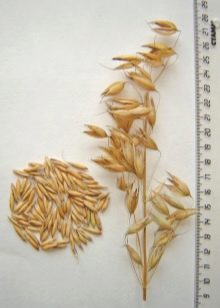
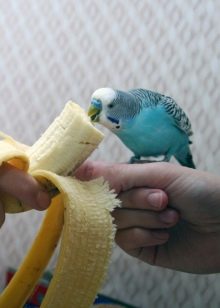
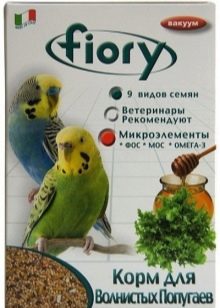
Rating of the best manufacturers
Parrot breeders are well aware that today a large selection of feeds of Russian and foreign production is presented on the market. Unfortunately, domestic feed in most cases is of low quality and are rather uniform small component mixtures. To make the bird strong, healthy, fully grow and develop, it is better to give preference to products of one of the following manufacturers.
Vitakraft menu vital
These cereal mixtures are considered one of the most useful - they contain a large amount of nutritional components and additives, therefore, they are both satisfying and healthy. In the manufacture of the grain mixture, high-quality natural raw materials are mainly used, which includes several types of millet (red, white and yellow), as well as safflower, canary seed, and oil nougat. All seeds undergo thorough pre-treatment, so the grain mixture does not contain any debris - you can safely offer such food to your birds.
It is noteworthy that the package contains a transparent window, thanks to which you can clearly see the contents of the box and its volume.
It is noted that the use of feed from this company strengthens the immunity of the bird, makes the color brighter, and the feathers are strong and dense.
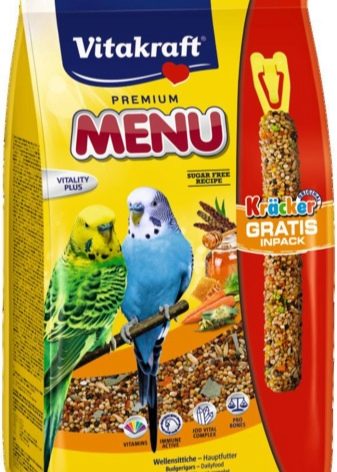
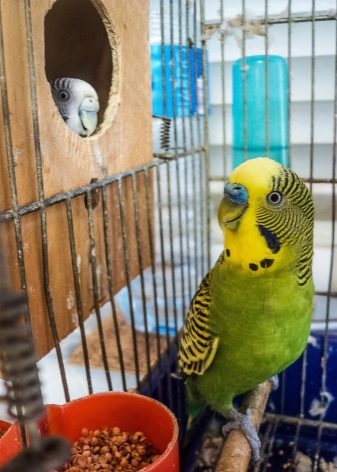
Thanks to the inclusion of vitamin and mineral components, the birds' health improves, the parrot maintains vigor and energy.
The advantages of the grain composition include:
- the inclusion of vegetables and green leaves of eucalyptus, which makes the food more nutritious and healthy;
- balance;
- exceptional health benefits of the mixture;
- affordable price.
However, it was not without minuses. The packaging is rather thin and single-layer, in the form of a bag - after opening it, after some time, the grain loses its useful properties. Finding such food in retail outlets is quite problematic: in retail stores it is quite rare.

Rio
Very high-quality balanced food for parrots, which for many years has been considered one of the most successful products of Russian production. The main components of the grain mixture of steel millet and sorghumas well as highly nutritious canary seed. A line of fodder for molting birds enriched with sesame seeds and protein components, and mixtures for birds during the breeding season contain egg assortment. Special germination mixtures are also available.
The advantages of Rio feed include:
- increased balance;
- a wide assortment line, including, in addition to the main composition, therapeutic mixtures;
- practical, high-strength packaging;
- enrichment with nutrients.
Of the shortcomings, it is worth noting the increased cost and a large number of fakes.
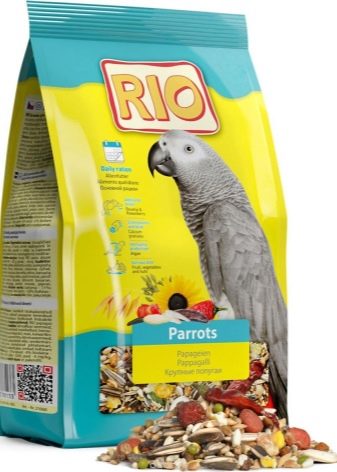
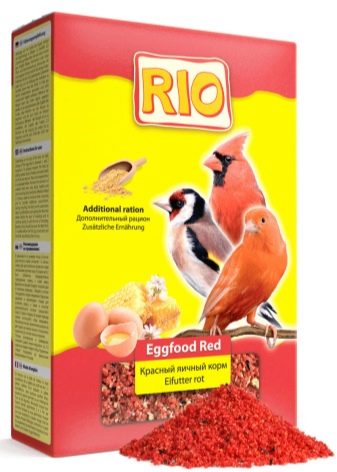
Prestige
Belgian-made food, the quality of which complies with all European requirements, standards and regulations. The mixture has many advantages:
- It consists of cereals of exceptionally high quality, does not contain any garbage, or additives of unspecified origin;
- the package is made of airtight material that protects the cereal mixture from the ingress of water, insects, and other harmful components;
- the package contains a special lock, so you can close the opened pack tightly;
- the feed contains only natural and nutritious ingredients that are necessary to maintain the health of the bird;
- low price.
At the same time, one should not forget that Prestige is a dry food, therefore regular water, as well as fruits, ripe vegetables and berries must be present in the diet of the bird.
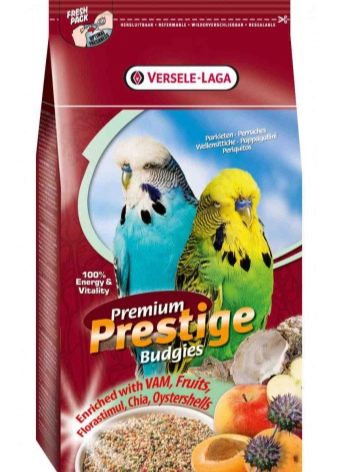
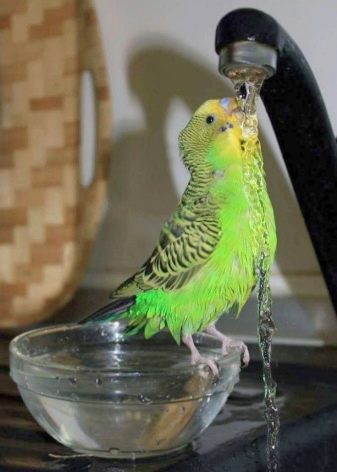
Trill
This is one of the most common grain mixtures that can be found in any store at a fairly reasonable price.
The pluses of this feed include a balanced composition and the presence of a special line of feed with a high iodine content - it is useful for birds with thyroid problems.
With the last type of feed, you should be as careful as possible - if you give them to healthy parrots, then in most cases this leads to the development of hyperthyroidism with a transition to oncology.
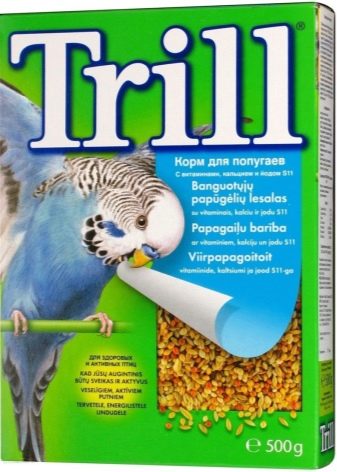
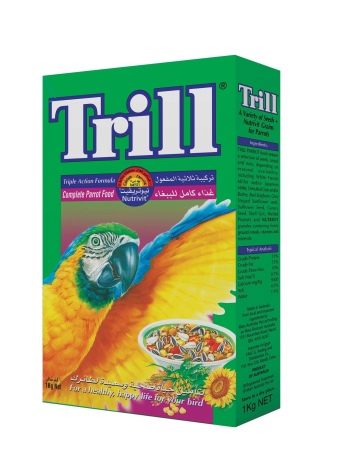
Padovan Grandmix Cocorite
One of the most sought after feeds among parrot breeders. This composition includes millet, as well as oats, canary seed and other useful components, it no debris or other foreign matter, no unpleasant odor. The mixture is different high nutritional value, therefore, the consumption of such feed is quite economical. The packaging is cardboard, dense, inside it the feed is sealed in a plastic bag.
Unfortunately, products of this brand contain granular components that many birds simply refuse to eat.
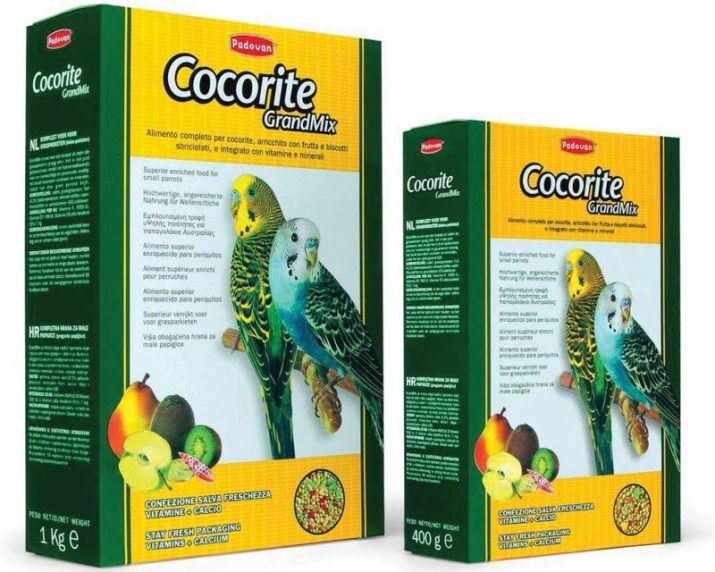
How to choose?
When choosing food should pay special attention to the following points.
- You do not need to buy a grain mixture if it is sold by weight or simply poured into an ordinary cardboard box - It is not known how long and under what conditions the product was stored. The grains could be wet for a long time and covered with mold, insects could appear in them, so the feed should be purchased exclusively in a sealed form.
- The grains must look shiny in appearance, and the aroma should be pleasant, any extraneous odors directly indicate the presence of chemical additives, it is better to refuse to buy such feeds.
- Do not buy mixtures containing balls or granules: your birds only need grain. Feed mixtures containing fruits are also not the best choice for birds. Fruits can spoil a grain mixture very quickly; moreover, dried fruits do not have all the nutrients that are found in juicy fresh ones.
- Be sure to study the composition of the feed indicated on the box, and compare it with the content. It is good if the package has a small transparent window.If when opening the box with the feed you find sand, grass and any other impurities - it is better to immediately throw away such a product.
- Of course, monitor your pet’s health. when introducing a new product into the diet. If the bird becomes lethargic, silent and lethargic, it is better to change the feed mixture and as soon as possible.
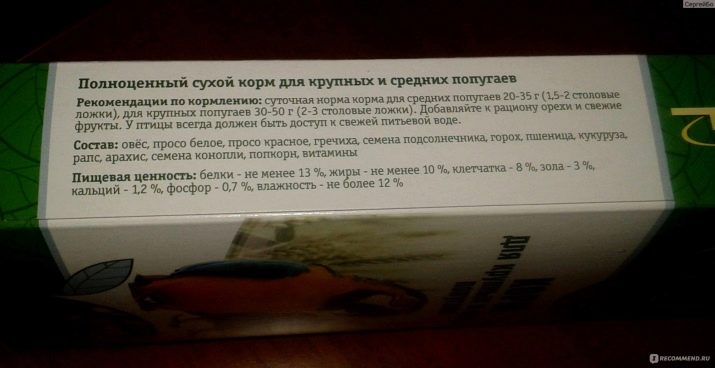
Feeding rules
After buying food, you should conduct a small test - a few grains should be placed in water and left for a couple of days. If the soaked grains begin to swell and germinate, you can safely dry them, mix with the rest of the cereals from the package and give to your bird. If the grain is "dead", then this food is strictly forbidden to give pets, in this case, cereals lose their nutrients, and sometimes even contain fungal spores, mold and other pathogenic microflora.
After purchase, be sure to pour the feed into a glass jar with a tightly screwed lid - the product must be stored in airtight conditions. The feed mixture must be strewed to the birds in the feeders 2 times a day, after having previously cleaned the husks from the previous feeding. The dosage depends only on the size of the birds - budgies eat up to 2 tbsp. l feed per day, large, respectively, more.
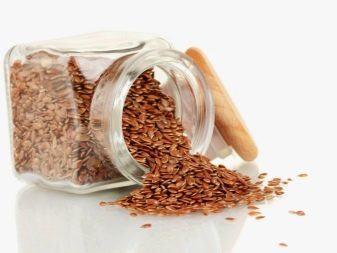
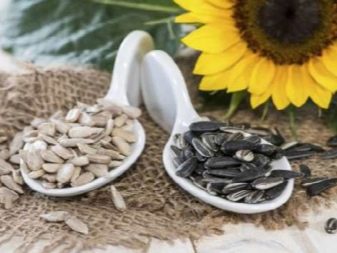
And, of course, it’s important to understand that grain feed cannot be the only product in the diet of parrots. In addition to cereals, the daily menu should include:
- porridge - they must be boiled in water without the addition of salt, sugar and oil;
- vegetables and fruits - with the exception of overripe and too sweet;
- sprouted grains - these products contain a large number of trace elements necessary for the full growth and development of birds;
- eggs - about 4-5 grams per day (a portion the size of a pea), and shortly before fertilization and during gestation and hatching, this amount is doubled;
- twigs and young shoots of fruit trees - contain the necessary vitamins and help grind off the beak.
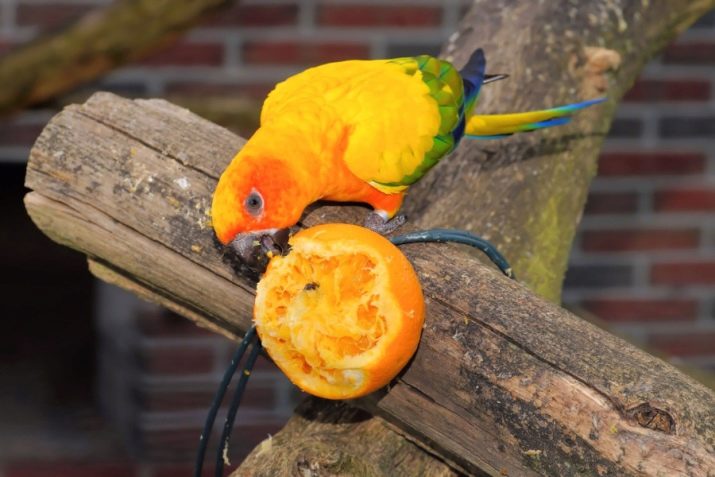
A recipe for delicious parrot porridge will diversify your pet’s menu.
